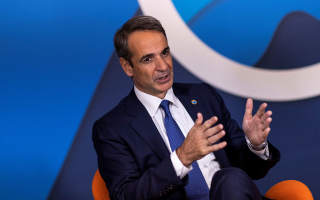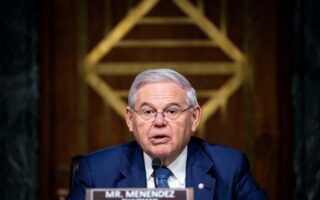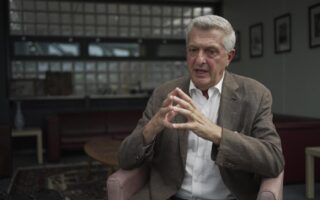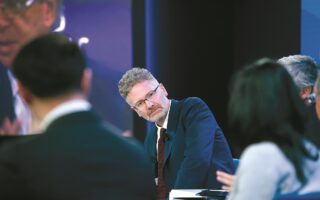Greece taking ‘lead’ in new energy landscape
US’s special presidential envoy for climate talks to Kathimerini about the global challenges of this age and what can be done
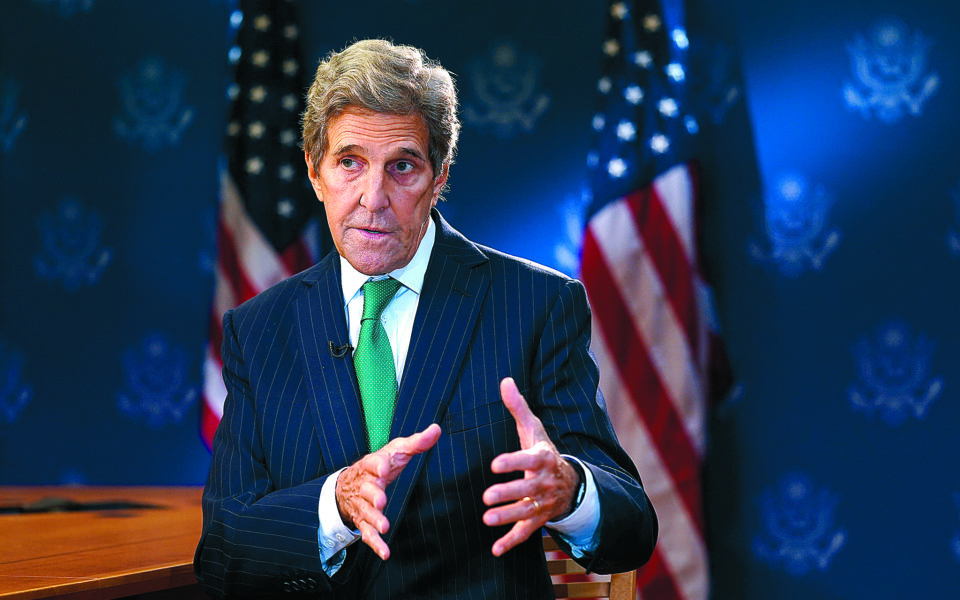
“We have every extreme being thrown at us by Mother Nature, but in fact, it’s Mother Nature reacting to what we humans have chosen to do,” says John Kerry, the first United States special presidential envoy for climate, in this interview with Kathimerini.
Speaking during a visit to Athens last week, Kerry argued that the best response to the energy crisis stemming from Russia’s invasion of Ukraine is energy independence through renewable energy sources, though he admitted that green energy sources are not sufficient on their own and cannot be the only response.
The former secretary of state told Kathimerini Greece is “doing a terrific job of taking a lead and putting in place policies that are going to make a difference on a host of different climate initiatives,” while adding that the “interconnection strategy for electricity coming from Egypt and or possibly Saudi Arabia through Greece is a very exciting prospect,” which, he said, may be a game changer for Europe.
Kerry, who spent 24 years in the US Senate representing Massachusetts and was the Democratic nominee for president in the 2004 elections against George W. Bush, also referred to the role of shipping, noting that “we have to all be doing things a little bit differently than we have been till now,” and stressing the need for developing certain fuels and the infrastructure between the world’s ports.
Are there areas where Greece and the US can cooperate on climate change, both on the scientific innovation side, but also on the practical business level?
Well, we are cooperating with Greece, and Greece is doing a terrific job of taking a lead and putting in place policies that are going to make a difference on a host of different climate initiatives. We’re very excited about working with Greece. The interconnection strategy for electricity coming from Egypt and or possibly Saudi Arabia through Greece is a very exciting prospect that could really alter the prospects for Europe as a whole. In addition to that, there are conservation measures that Greece is taking, the forests, the plan for forest protection. And we’re very grateful to Greece and the prime minister and the foreign minister for stepping up and taking on the challenge of the Our Ocean Conference, which will take place here in 2024. Already Greece is beginning to prepare and think about that. Greece has a great maritime history, it has a great cultural history, and the two of them now come together and are being protected in the context of the climate crisis. Greece recognizes that we all need to do more. We need to do it faster. And this is a country that I have no doubt is going to be leading in the forefront of our response to the climate crisis.
Given the dependence on Russian gas and the shortages stemming from the present energy crisis, how can countries deal with this problem and at the same time be green?
Because the best answer to dealing with the crisis of Ukraine is to become energy independent. And the best energy independence will come through renewable energy. Now, is that the whole answer? No. You have to also make sure that you have the energy security you need to keep your economy moving when the sun isn’t shining or the wind isn’t blowing. We all understand that. But there are different options now being developed that will facilitate that, whether it’s green hydrogen or whether it is fuel cells or whether it’s going to be nuclear technology or others. We have the capacity now to do what the science tells us we need to do over the next eight years. And the science is saying the world must reduce emissions by a minimum of 45% to 50% by 2030. You know, 65% of global economic effort is committed to do that. So now we have to bring a few other nations on board. But happily, Europe as a whole and Greece are among those entities that are committed to do it. And I saw your minister of energy, minister of the environment, your shipping minister, all of them are clearly very seized by this issue. They understand the responsibility and they are deeply committed, I think, to making sure Greece does its part.
You mentioned before the Our Ocean Conference coming to Greece in a little more than a year from now. How successful has this process, which began in 2014 when you were secretary of state, been? Because a lot of times, to be honest, there’s a lot of goodwill, a lot of talk, but the walk sometimes is not there.
Well, the walk is there. I would say to you that the walk and the run and the swimming are all there. People are 100% committed. Let me tell you what’s happened. We have over $100 billion of commitments that have been made since 2014, which are being fulfilled. You have marine protected areas that are being protected. You have new technologies being applied to different kinds of protections of the ocean. You have initiatives on sustainable farming in the ocean for seaweed, for instance, for shrimp, to do it in an environmentally friendly way. So, you’re not polluting and you’re not leaving things worse than you found them. I’m very excited about the conference here. I think Greece is the perfect nation to be doing the ninth conference, which will be in 2024. It’s not that far away because already we’re in September and the next conference will be in about four months in Panama. And then about one year later, you’ll have Greece stepping up. In the Palau conference that took place just a few months ago there were major commitments made, about 16 billion additional dollars of commitment represented in 400 additional new initiatives that are being taken. The initiatives range from, as I said, a protected area or a new fishing standard to adaptation of initiatives to help the island states where already the sea level rise is having an impact. The difference in this conference between a lot of other conferences that I’ve been to historically, is this is an action-based conference. People stand up and state the commitment that they’re making and have to account for those commitments over the previous years. So nobody’s getting away with the flimflam of just saying, you know, we’re going to do something. It’s measured by all their colleagues, by everybody in the business of advancing ocean protection. And what folks need to understand is, you can’t solve the crisis of climate without paying attention to the ocean. Because it’s so integrally related to the climate of the world and to what happens. Ninety percent of the warming of the earth goes into the ocean, and that has a profound impact on the ocean itself. It also contributes to the moisture that then falls in these horrendous rainstorms and floods. You see what’s happening in Pakistan. I mean, it’s all related. You also can’t solve either crisis, the climate or the ocean, without the other being involved in it. The acidification of the ocean comes from the coal burning and the coal being used for power. It comes from the pollution that goes up in the air, comes down into the ocean. So you can’t save the ocean if you don’t also get rid of the emissions and begin to deal with this problem. I think it’s the interconnectedness that leaps out at you from these conferences. And I can’t think of a better nation to host this conference than a country with as much of a cultural, historical link to the ocean, a maritime nation. And already, today, Greece is the leading maritime shipper, the leading shipping nation in the world.
The US’s ‘first big step’
The US president and Congress recently agreed on a $437 billion bill which also covers climate change. Is it enough? Is it just the first step?
Well, it’s the first big step. It’s a very significant piece of legislation. It’s the most significant climate piece of legislation passed by the United States Congress in history. And it is going to provide billions of dollars of incentives for people to be able to go out and buy and afford to buy electric vehicles. It will help us build out our infrastructure in ways that will provide the charging stations and the facilitation of green travel. It is going to put an enormous amount of energy into the development of the new technologies that are going to be critical to making this transition happen. But this legislation is going to excite the private sector. There will be much greater investment, much greater commitment to moving forward faster. So I’m really excited by it. And I think President Biden has made it very, very clear this is an economic opportunity. This is more jobs, different alternatives of types of jobs that will be available to people. And already we are seeing states and cities in the United States really rushing to accelerate their efforts in order to meet the challenge. So I’m very excited about this legislation. It’s historic and it will have a major impact.
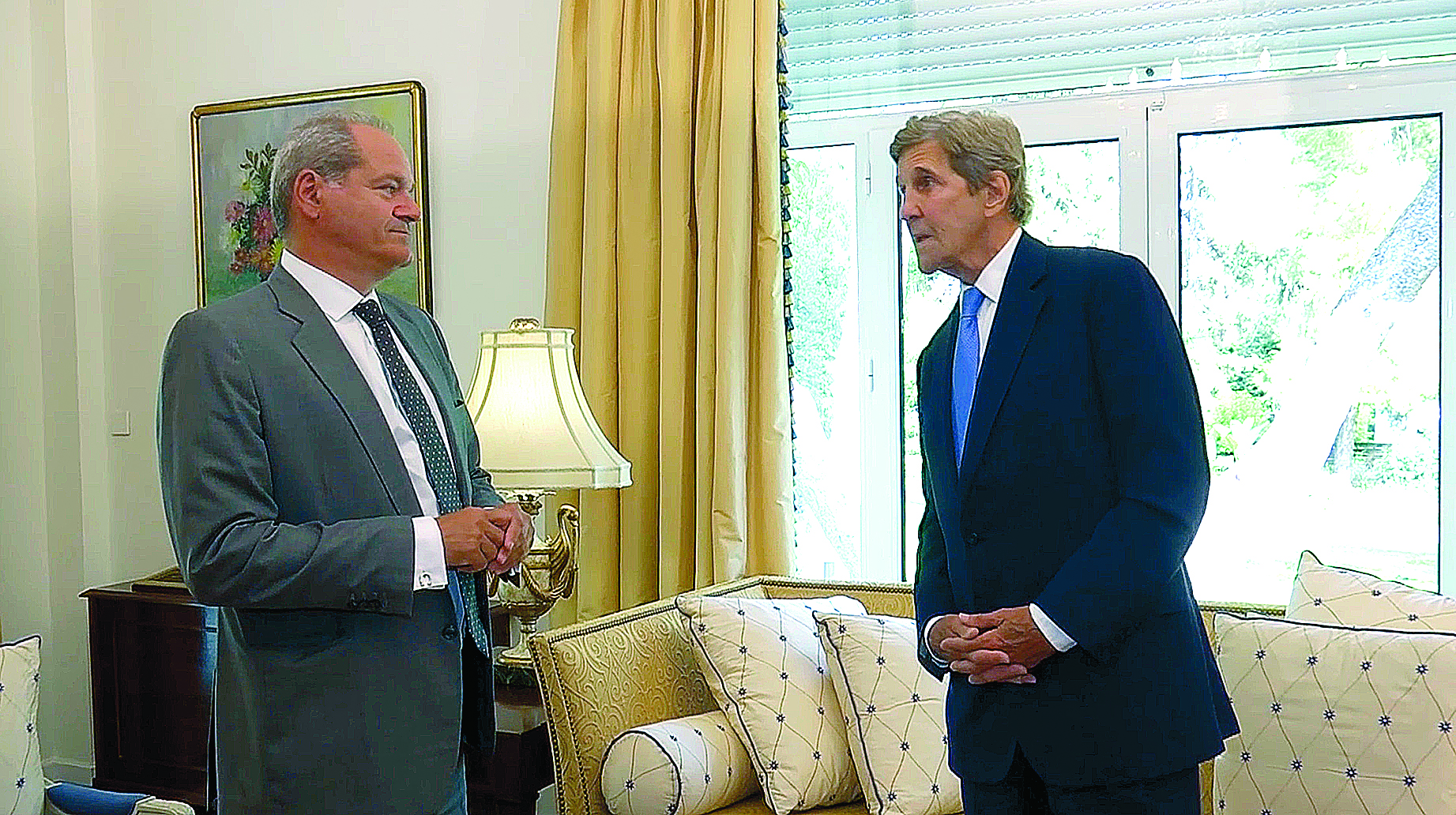
Green shipping
There’s been a lot of talk about green shipping. And you just mentioned Greece is the number one country in this area. What can Greek shipping do or shipping in general do?
I had the privilege of meeting with a number of shipping entities, representative of Greek shipping, not entirely, but a great representation. And we had a very candid discussion about the challenges of how ships need to change their propulsion. They have to have an entire shipping food chain from the port facilities to the fueling to the plastic to the other components of life in the modern world. Today, we have to all be doing things a little bit differently than we have been till now. Will shipping change overnight? No, it’s going to take a little while here. We have to develop some of the fuels. We have to develop the infrastructure between ports around the world so that people aren’t stranded because they had one ability to do something in Greece and then they get to some other part of the world, Latin America, Asia, and the facilities aren’t there. So, we will have to all work together to build this out. But shipping, if it were a country, would be the eighth largest emitter of greenhouse gas emissions in the world. Therefore, it’s on a par right now with some of the top emitters of the world, with India and Russia and Indonesia and other countries. So, all of us have to step up and be part of the solution here. And if we start working in an accelerated way now, we can get ahead of the curve and make a difference.
Was what you heard satisfactory? Are you optimistic? As you said, it takes a long time.
Well, I’m always optimistic by nature. I wouldn’t get up in the morning and do this job. But I can tell you that the trip here to Athens and to Greece has been extremely affirming of the participation of one country in a very constructive and positive way that will make a difference. And so I think we just build on it. We have to build on this. It’s not a one-day visit. It’s something we have to continue to do over these next months and years. The goal is net zero by 2050. We have to get to a 45% to 50% reduction by 2030 in order to achieve that goal of 2050. I feel good about the visit and I’m confident that Greece is going to make very significant contributions, both in the shipping sector, but also in the overall approach to energy transfer, energy transition to partnering with the region, particularly this interconnectivity between the African continent and the Middle East and what could be provided for Europe to help cope with the challenge of Ukraine and energy costs.
You mentioned the crisis, Russia, Ukraine, transportation. Greece, given its location, is strategically placed. Lately there has been a lot of cooperation with many Western countries, especially the US. I was wondering how does the US assess Greece’s role in this process of getting energy into the Balkans and other European markets?
President Biden believes, and I am convinced about this, that Greece is an essential and very important strategic partner for this region, as well as its partnership with the other countries I mentioned earlier. Greece will play a very key role in this economic transformation and in our response to the challenge of costs of energy today and what’s happening in Ukraine. We’re lucky to have a good partner.
A final question about wildfires, something painful, dangerous, heartbreaking for everybody. California and the US in general, like Greece, have an issue every summer. To put it plainly, what do we do?
Well, I think, again, Greece has been smart in trying to be proactive in its response to the fire challenge and by quickly responding to increased observation and rapid response to the fires, they’ve been able to contain it somewhat. It will remain a huge challenge. The warming that is taking place is not going to suddenly disappear tomorrow. We are going to face this challenge all around the world. There are vast fires that have taken place in Russia, Indonesia and various parts of Asia. We’re losing.
Flooding and wildfires all over the world.
We have every extreme being thrown at us by Mother Nature, but in fact, it’s Mother Nature reacting to what we humans have chosen to do. This crisis is human created. And it is a matter not of ideology, not of politics, but a matter of mathematics and physics that is demanding the response that we are summoning. So, we have to face up to that reality. Greece is way ahead of the curve in understanding that reality. And I’m very optimistic about what Europe as a whole is going to do in these next months and few years, which are critical to all of us.
